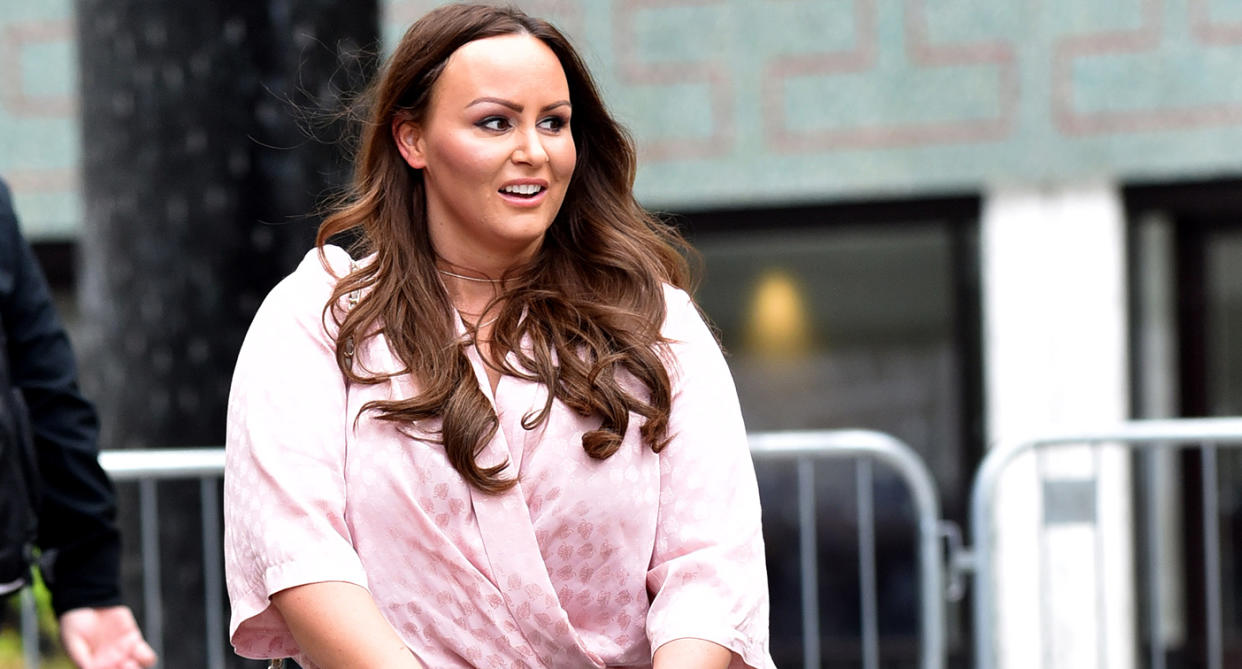Chanelle Hayes gets real about female hair loss with graphic image of her hair transplant

Chanelle Hayes has opened up about her hair transplant, revealing that years of yo-yo dieting had left her hair falling out.
The 32-year-old former ‘Big Brother’ star has shared the results of her hair transplant on Instagram explaining that she had undergone the procedure last month after years of fluctuating weight affected her natural hairline.
Sharing an image of her new hairline on Instagram, the mum-of-two also discussed her motivation for having the procedure: “I’ve always had a masculine, high hairline and it’s always been something that’s bothered me and affected my confidence,” she wrote.
Read more: Ricki Lake says hair loss struggle left her feeling 'suicidal'
She went on to explain that she was opening up about the transplant in a bid to break down the silence surrounding female hair loss.
“It’s so taboo for some reason for females to discuss hair loss and so I wanted to be clear, open and transparent about the whole thing,” she wrote.
“Would I love to have a long, thick head of shiny hair naturally? Yes, but I don’t.
“So I am working with what I have. And getting a FUT method hair transplant was the first step to looking feminine, becoming more confident and gaining back some of my lost self esteem that ran away with my hair!”
Read more: Has a cure for baldness been discovered?
The reality TV star has previously revealed that her diet and fluctuating weight had impacted the health of her hair.
“I always hated my forehead, but my weight gain and loss has really receded my hairline and thinned out my hair,” she told Closer magazine.
“Gaining weight also changed my face. So this transplant is just one thing to get me on my way to feeling better about myself.”
Chanelle also opened up about her struggles with hair loss on ‘Loose Women’ in 2016, admitting: “My doctor told me I’d done lasting damage and there’s nothing I can do to change that.”
“My hair is so thin and horrendous from the lack of nutrients, I've got like five real hairs left. When I was excessively dieting it got thinner and it's never recovered.”
Read more: Kate Ferdinand explains how body dysmorphia caused her to suffer hair loss
How does diet impact hair loss?
According to Anabel Kingsley, Consultant Trichologist & Brand President at Philip Kingsley one of the most common types of hair loss, particularly in women, is Telogen Effluvium (TE), or “excessive daily hair shedding”.
Kingsley explains that TE causes a sudden and greater than normal number of hairs to move from the growth to the resting (and then shedding) phase of your hair cycle, hence the hair loss.
“It is a reactive hair loss caused by an internal imbalance or shift,” she adds.
And some of the most common causes of TE is crash dieting and rapid weight loss.
Lack of nutrients can also play a role in female hair loss.
“Diet is incredibly important to hair health since hair cells are the second fastest growing cells the body produces, meaning their energy and nutrient requirements are great,” explains Kingsley.
“Also, as hair is non-essential tissue, it's the last part of us to receive nutrients and the first to be withheld from. This means if your diet is lacking, vitamins and nutrients you are deficient in will simply be used to keep essential systems functioning, with your hair receiving little, if any.”
Consultant hair transplant surgeon Dr Asim Shahmalak from Crown Clinic agrees that hair loss in women can be sign of nutritional deficiencies, including deficiencies of vitamins A, D, B12, iron, zinc and protein.
“One of the most common causes of hair loss is low iron,” he explains. “Up to 60% of women have low iron and it is often undiagnosed.”

Similar to an iron deficiency, a lack of vitamin B12 can also cause hair loss as well as feelings of extreme lethargy.
“The body needs vitamin B-12 to keep metabolism consistent and to produce red blood cells, which carry oxygen to the scalp.
“It's common for vegans to struggle to get enough B12, largely because it's predominantly found in animal products.
“You can get vitamin B12 from specially fortified foods such as milk products, vegan spreads, nutritional yeast flakes, yeast extracts and breakfast cereals.”
In order to help minimise hair loss Kingsley recommends women eat a well-balanced diet, rich in protein (what your hair is made of), complex carbohydrates (which provide energy to hair cells) and iron (needed to produce hair cell protein).
“A balanced diet is important because if you’re deficient in a certain vitamin or mineral it can affect your hair,” she explains.
“Lean meats and fish contain all essential amino acids (proteins your body cannot make on its own). Oily fish, such as salmon, are also rich in Omega 3 – and this can have a positive impact on the health of the scalp.
“Seafood, such as shrimp, contain great levels of Zinc – which is also important to the hair.
“Beef contains Iron and Vitamin B12 – two other hair-essential nutrients,” she adds.



